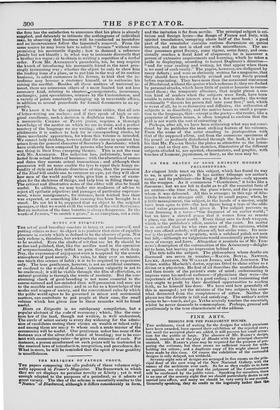ON THE DEATHS OF SOME EMINENT MODERN PHILOSOPHERS.
Ax elegant little tract on this subject, which has found its way to us, is quite a puzzle. It has neither titlepage nor author's name ; and its publisher—the King of Bibliopoles—only appears on the wrapper. As it commences "Gentlemen," it looks like a discourse ; but we are left in doubt as to all the essential facts of an oration—the time when, the place where, and the persons to whom it was delivered. All this is strange; in this age of dilu- tion its brevity is stranger still. Only 28 small pages; when, by a little management, the subject, in the bands of a master, might have been spun to 280—the last figure being a type of the addi- tional value .expansion had given it. The subject prevents us from fancying it a torso—" the fragment of an earlier world;" but we have a shrewd guess that it comes from as remote a place, viz, the great world. Every thing save its drab wrapper, which is the publisher's affair, smacks of the court. Its matter is so ordered that lie who runs may read. Its opinions, whilst they can offend nobody, will please all, but strike none. Its man- ner is the perfection of propriety, with a subdued polish not seen but felt,—although we vulgarians would occasionally prefer a little more of energy and force. Altogether it reminds us of Mr. Tom- x NS'S description of the conversation of the Aristocracy—delight- ful to hear, but leaving no impression behind it. The title tells the subject. The philosophers whose deaths are discussed are seven in number,—BACON, BOYLE, NEWTON, LOCKE, ADDISON, Sir WILLIAM JONES, and Dr. JOHNSON. The writer, unlike Macbeth's doctor, appears fitted to shine either as a divine or a physician. He first of all describes the mortal disorder, and then treats of the patient's state of mind; endeavouring to impress upon his medical audience—if physicians they were—the importance of Christianity to a good ending ; and insinuating that they ought to profit by their deathbed opportunities to confirm faith, as he himself has done. We have said how gracefully all this is managed; yet the mixture of the two subjects has some- what detracted from the completeness of either. Neither the physic nor the divinity is full and satisfying. The author's notion seems to be—touch, and go. Yet he scarcely touches the essentials, whilst he never descends to commonplace. Perhaps, general and gentlemanly is the true characteristic of the address.


























 Previous page
Previous page